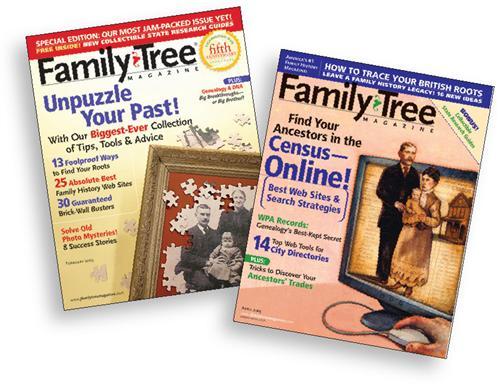Sign up for the Family Tree Newsletter Plus, you’ll receive our 10 Essential Genealogy Research Forms PDF as a special thank you!
Get Your Free Genealogy Forms
"*" indicates required fields
Just in Time
Thank you for putting timelines in the Family Tree Magazine articles that feature states or countries. I am a genealogist and president of a local genealogy club. I share different articles with members at our monthly meetings and really enjoy the magazine. I, too, reference a timeline when I research an area where I’m searching for relatives. It involves some history reading, but that’s OK!
Virginia Stuvick, Huntley, Ill.
Pulling It Off
The South Suburban Genealogical and Historical Society (SSGHS) <www.rootsweb.com/~ssghs> appreciates our Pullman Collection being mentioned in the article about occupational records (April 2005); however, we relocated from South Holland to Hazel Crest, Ill., two years ago. We now have a modern facility with double the floor space for our 10,000-volume research library. Thank you and keep up the good work.
Robert Roach, SSGHS President, Hazel Crest, Ill.
DNA Detour?
I’ve been reading your magazine for some time and find it informative, useful and professionally done. In digging into the article “Demystifying DNA” in the February 2005 issue, however, I was struck by a sentence that would have tripped me up as a genealogical newbie several years ago. The section on Y-DNA states: “Because Y-DNA and surnames travel together through time (with the occasional exception of a nonpaternity event such as illegitimacy or adoption) …” I can think of at least one fully legitimate circumstance when a surname isn’t passed, and that is the patronymic naming convention used in Scandinavian countries (and probably others, although that is where the bulk of my ancestry and research take me).
A statement such as the one above would have had me searching in certain surname groups when I really needed to focus on location, patronymics and other clues to be sure I was following the right line.
To keep people from veering off in a direction that might not prove helpful (like me trying to chase a group of Blixruds only to find it’s not strictly a surname, but a Norwegian place name), a mention of nonsurname-based research would be helpful.
Mary Blixrud Sletten, via e-mail
Attention to Attendance
I enjoyed reading David Fryxell’s article on the past five years in genealogy (February 2005). It made me think a great deal about the changes the genealogical community has undergone since 2000. I would like to comment on a statement he made about attendance at genealogical conferences. Having heard comments about dwindling attendance at conferences, the Conference Planning Committee of the Federation of Genealogical Societies (FGS) studied attendance at the past 10 conferences it has held (1996 through 2005). The results show that attendance at FGS conferences has been remarkably consistent over the past decade.
Attendance figures do vary depending on a number of factors, the most significant being the location of the conferences. The largest dip occurred the year after the Sept. 11 attacks, when the 2002 conference was held in California. Experience has shown us that all national conferences have a difficult time attracting attendees in California in general. Attendance has actually grown greatly at each of the subsequent conferences, and with the 2005 conference planned for Salt Lake City and the 2006 conference planned for Boston, we anticipate numbers to climb even higher than before. And the federation is working hard with our member societies to find ways to reverse the membership erosion that has occurred since the advent of the Internet, dedicating entire sessions to this topic during our annual conference.
Michael J. Leclerc, FGS Conference Planning Committee Chair, Boston
Picking Up the Pieces
This morning, I got up at 7:30 and went mall walking. When I left the mall, there was a bookstore next door. I decided to go in (just to look). I browsed through a lot of magazines, and what stuck out about yours was the picture on the front of trying to solve a puzzle (February 2005). Putting pieces together. I had never thought of my genealogy work in that way, but it is true. I am and have been trying to solve a huge puzzle for many, many years. Sometimes I give up for awhile, but eventually I go back to it and put in another piece.
Thank you for your magazine with your “25 absolute best family history Web sites.”It has gotten me motivated once again to continue my search.
Lynn Gehrke, via e-mail
Internet Laments
I agree with Connie Lockhart’s letter regarding Ancestry.com <Ancestry.com > (February 2005). I, too, have had the problem of ending up at that Web site when supposedly accessing other sites. It’s a waste of valuable research time! It would be simpler for the Web sites to note where the link takes you (some now do), so you may avoid those you do not want to visit! Now, too, it seems that many genealogy sites are charging very high subscription rates to access their information. I wonder how much of that information they gathered and how much was “donated” by unsuspecting researchers.
Some very good sources for genealogical information are the “oral history” programs of several universities and museums. Often, these oral histories are transcribed and available in hard copy (for a fee).
Leta Morgan, via e-mail
Editor’s note: We often get mail bemoaning the number of Ancestry.com links on other genealogy Web sites, especially ones that claim to offer free resources. If you find a particular site’s way of presenting links to subscription databases frustrating or misleading, we encourage you to contact the webmaster with your concerns. And it wouldn’t hurt to offer constructive suggestions. Remember: Operators of most “homegrown” genealogy Web sites aren’t aiming to deceive or aggravate their visitors. They’re simply trying to earn commissions to offset the costs of running their Web sites, so they can continue to help fellow family historians.
ADVERTISEMENT


